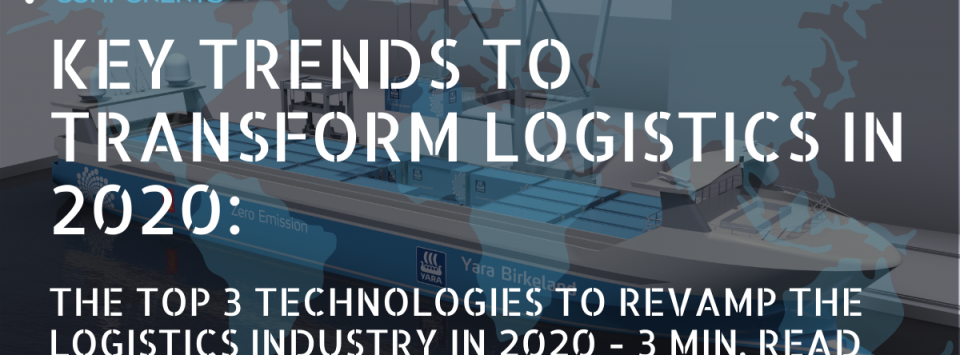The top 3 technologies set to revamp logistics in 2020.
The logistics industry is set for major changes in the near future. As innovations and technology are increasing, industries are changing, and logistics may be one of the most impacted sectors. The logistics industry has already seen massive advancements in recent years; improved analytics, automation, and many others. Market watchers expect a few key technology trends will transform logistics and bring with them new expectations and standards to be upheld by logistics companies, who either adapt or fall behind. Aegis Components has identified the top 3 key trends that are likely to transform the logistics industry in 2020.
-
Digitization
-
Autonomous transportation
-
Blockchain
- Digitization is simply the conversion of analog information (paper-based) into a digital format, in other words, it is the replication of the physical world into a digital format. This conversion is expected to drive trade growth through digitally enhanced cross-border platforms.
Why should Logistics care?
Because digitization enables:
- Centralized data control
- Accurate, verifiable, manageable, and accessible information
- Real-time operation data management – visibility
- Improved communication and collaboration capability
- Sustainable synchronization for streamlined workflow and business processes
- Greater data accuracy for operational execution, analytics, and reporting
- System driven audit support – for freight audit management
- Higher levels of 3rd party execution visibility and influence
- Simplified integration and interfacing with 3rd party information providers
- Increased productivity – eliminated manual processes
- Autonomous shipping methods are becoming a reality for logistics professionals in 2020, as many large players are beginning to invest into the idea. DHL has developed a parcel copter that will enable fast and flexible sending and receiving of parcels in geographically demanding locations. Rolls-Royce is developing connected drone container ships while several other logistics providers are developing self-driving and connected cars. Autonomously driven ships would ideally not need any crewmembers, and there are several obvious advantages to going crewless.
- Elimination of HVAC, food, water, and other life-sustaining systems
- The design of the ship wouldn’t include quarters, stairs, mess, doors, or any unnecessary features of traditional ships, opening space for more cargo per trip.
- Weight savings due to the absence of traditional systems.
- Improved weight distribution – traditional ships haul heavy ballasts for no purpose other than to keep the ship level.
- Reduced electrical consumption due to the absence of traditional systems.
- Lower wind resistance due to the absence of the bridge and other protruding features.
- 10-15% fuel savings
The “Yara Birkeland”, the world’s first all-electric autonomous cargo ship, is due to be launched in 2020. In addition to the benefits from its autonomous capabilities, the new vessel will reduce emissions, and even improve road safety by replacing up to 40,000 truck deliveries annually in populated urban areas.
- Blockchain technology records transactions, tracks assets and creates a transparent and efficient system for managing all documents involved in the logistics process. For the logistics industry, blockchain is promising to create transparency of all documents and transactions across the freight landscape, ultimately increasing the efficiency, agility and innovation of supply chains. The adoption of blockchain would allow the entire supply chain to operate faster, smarter, and more securely. Reports indicate that blockchain will bring a 5% increase in global GDP and a 15% rise in trade volume in 2020.
According to Entrepreneur.com, “the era of smarter and faster logistics has just begun. The industry is poised for massive growth and is expected to reach $12,25 billion by 2022. Today, efficient logistics is not just an added advantage for companies, but a key differentiator and growth enabler in the supply chain”. As a distributor of electronic components, we constantly adapt our logistics solutions to our clients demands. To learn more about how Aegis Components can help you, click here or contact us today!
Source: www.powerelectronics.com
